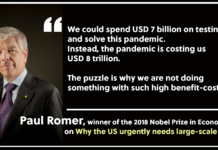Tag: Macroeconoics
Interview with Paul Romer on large scale Covid testing – Transcript
Edited transcript of our interview with Paul Romer, on why the US urgently to scale up testing for Covid-19 and why he thinks the covid-crisis amounts an intellectual failure
US needs large-scale Covid testing urgently: Nobel winning economist Paul Romer
In an exclusive interview with EconReporter on Tuesday, Romer, co-recipient of the 2018 Nobel Prize in Economics Science, urged the US to adopt large-scale testing immediately to halt this most detrimental economic slump ever since the Great Depression in the 1930s.








